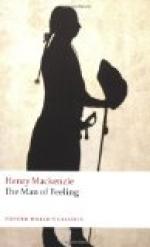When Peter was gone, he stood with his eyes fixed on the ground, and the last words of his intelligence vibrating in his ears. “Miss Walton married!” he sighed—and walked down stairs, with his shoe as it was, and the buckle in his hand. His aunt, however, was pretty well accustomed to those appearances of absence; besides, that the natural gravity of her temper, which was commonly called into exertion by the care of her household concerns, was such as not easily to be discomposed by any circumstance of accidental impropriety. She too had been informed of the intended match between Sir Harry Benson and Miss Walton. “I have been thinking,” said she, “that they are distant relations: for the great-grandfather of this Sir Harry Benson, who was knight of the shire in the reign of Charles the First, and one of the cavaliers of those times, was married to a daughter of the Walton family.” Harley answered drily, that it might be so; but that he never troubled himself about those matters. “Indeed,” said she, “you are to blame, nephew, for not knowing a little more of them: before I was near your age I had sewed the pedigree of our family in a set of chair-bottoms, that were made a present of to my grandmother, who was a very notable woman, and had a proper regard for gentility, I’ll assure you; but now-a-days it is money, not birth, that makes people respected; the more shame for the times.”
Harley was in no very good humour for entering into a discussion of this question; but he always entertained so much filial respect for his aunt, as to attend to her discourse.
“We blame the pride of the rich,” said he, “but are not we ashamed of our poverty?”
“Why, one would not choose,” replied his aunt, “to make a much worse figure than one’s neighbours; but, as I was saying before, the times (as my friend, Mrs. Dorothy Walton, observes) are shamefully degenerated in this respect. There was but t’other day at Mr. Walton’s, that fat fellow’s daughter, the London merchant, as he calls himself, though I have heard that he was little better than the keeper of a chandler’s shop. We were leaving the gentlemen to go to tea. She had a hoop, forsooth, as large and as stiff—and it showed a pair of bandy legs, as thick as two—I was nearer the door by an apron’s length, and the pert hussy brushed by me, as who should say, Make way for your betters, and with one of her London bobs—but Mrs. Dorothy did not let her pass with it; for all the time of drinking tea, she spoke of the precedency of family, and the disparity there is between people who are come of something and your mushroom gentry who wear their coats of arms in their purses.”
Her indignation was interrupted by the arrival of her maid with a damask table-cloth, and a set of napkins, from the loom, which had been spun by her mistress’s own hand. There was the family crest in each corner, and in the middle a view of the battle of Worcester, where one of her ancestors had been a captain in the king’s forces; and with a sort of poetical licence in perspective, there was seen the Royal Oak, with more wig than leaves upon it.




